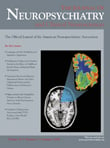To the Editor: Posterior cortical atrophy is a clinical syndrome in which Alzheimer’s disease seems to be the major pathologic cause.
1 –
4 This progressive dementia initially presents with visual disturbances, including some or all features of Balint’s syndrome and Gerstmann’s syndrome, with a later onset of cognitive decline associated with typical Alzheimer’s disease.
1 –
4 Postmortem studies show predominant occipitoparietal atrophy generally associated with neuritic plaques and neurofibrillary tangles.
3 Visual hallucinations occur in up to 25% of patients who are diagnosed with posterior cortical atrophy.
1,
4 We report a case of a patient with posterior cortical atrophy who was experiencing intolerable complex hallucinations that were successfully treated with risperidone after an unsuccessful trial of quetiapine.
Case Report
A 66-year-old married, Caucasian woman with a 10-year history of cognitive decline, characterized by early onset of visual impairment not associated with anterior visual pathology, was brought to the psychiatric emergency department by her daughter for severe mental distress caused by visual and auditory hallucinations. The hallucinations consisted of a young, vulgar girl who reportedly stole the patient’s clothing, demanded to eat the patient’s food, falsely informed the patient that her husband was physically ill, and threatened to kill the family pet. The patient was often awake at night agitated and responding to the hallucinations.
The hallucinations began about 8 weeks earlier. Two weeks prior to the emergency department visit, the patient was prescribed quetiapine, 50 mg b.i.d., by her primary care physician. Her medications also included memantine, 10 mg b.i.d., donepezil, 10 mg daily, and venlafaxine XR, 150 mg daily.
Upon examination, the patient had Balint’s syndrome, Gerstmann’s syndrome, ideational and ideomotor apraxia, prosopagnosia, fluent aphasia with anomia, and demonstrated paraphasias and neologisms. She had difficulty maintaining and shifting set. A physical exam was unremarkable, but notable for the absence of parkinsonian signs such as cogwheel rigidity, stooped posture, shuffling gait, bradykinesia, and resting tremor. A brain CT showed diffuse cortical atrophy with a pronounced parieto-occipital predomination. The patient was diagnosed with probable Alzheimer’s disease with posterior cortical atrophy syndrome.
The patient was admitted to the inpatient medical psychiatry unit and treated with risperidone, 1 mg h.s. Quetiapine was discontinued and her preadmission medications were continued. Initially, the patient was often found verbally responding to the hallucinations, was tearful, and was not able to be redirected. Over the course of 10 hospital days, the hallucinations significantly decreased in frequency and severity. She was transferred to an assisted living facility with no further subjective concerns about the hallucinations.

